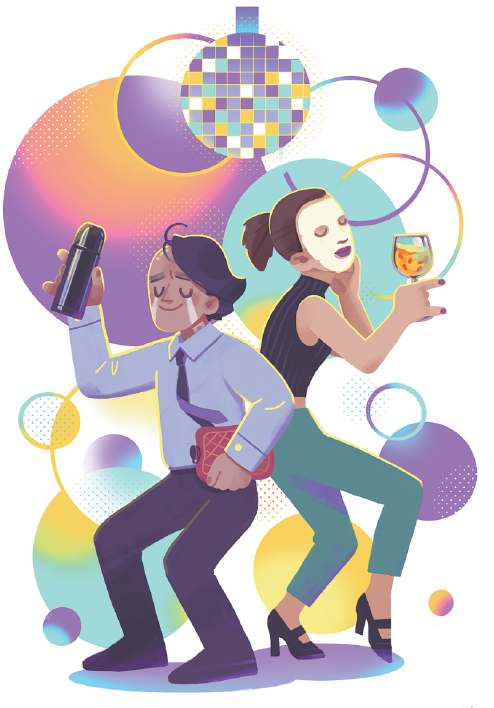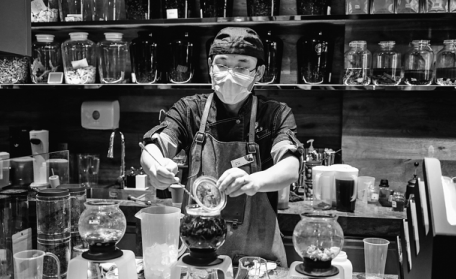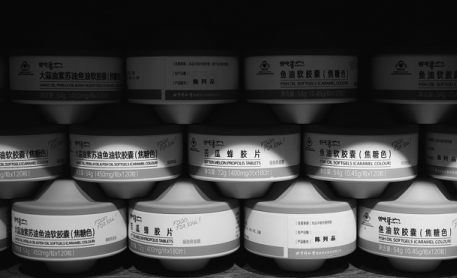Too busy to be tired, too tired to be busy
Young people today are drowning in their cares, but there's nothing like a night on the dance floor, hard liquor and some kind of magic potion to pull them back to good health.

In the 1970s the Western world gorged itself on fad diets, from Atkins to Scars-dale, and the millions of books about them that were sold helped keep the publishing industry in good shape. About the same time, punk rock music made its world debut.
Turn the clock forward half a century, and dieting and punk have been sewn seamlessly together-in China of all places-to give us pengke yangsheng, the punk diet.
Of course, the thing about fad diets is that often what they most have going for them is a catchy name, and that may well apply to the punk diet. In fact strictly speaking the name seems to describe a lifestyle-an attitude even-rather than a food regime, even if it does relate to what one consumes. Also, as with many new fangled phenomena like this in China, its genesis, or at least the name, seems to have been conceived in cyberspace.
But let's take ourselves away from the internet for a moment and into the real world, and talk about how one can spot a punk dieter. Consider these three pictures: In one hand a young man holds a thermos flask cup with steam pouring out of it, and in the other he holds a glass half full of scotch on the rocks. After staying up for half the night and catching a lot fewer than forty winks a young woman sits there applying the most expensive face pack to her visage. A group of three hits the disco floor, ostensibly to keep fit, and between dances imbibes whiskey soaked in goji berries.
So unlike a conventional diet that runs a straight line emphasizing healthy eating and engaging in physical activity, the punk diet, championed by Generation Z, those born this century, bounces back and forth between extremes, its practitioners taking great delight not only in the irony but in the fact that they are leading an oh-so trendy lifestyle as well.
However, when you delve below the thin surface of all this, you find that young people do seem to have piled on themselves-or had piled on them-such a weighty load of academic and work pressures that it is no wonder that at such an early age they have cottoned on to the idea that they had better start caring for their health, too.
Last year National Health Insight Report published by Dingxiang Doctor, a dedicated medical information app, said that of the four age groups, the post 1960s, 70s, 80s and 90s, the younger the person was, the dimmer the view they had of their personal health.
"On the one hand is fast-paced work and life generally, and on the other is anxiety about losing one's competitive edge," says Jiang Wenxiu of the Department of Psychiatry, Zhongda Hospital, Southeast University in Jiangsu province.
"Young people always seem to feel that they must do something to defend their hairline, or to resist the fine lines that climb up around the corners of their eyes."
A survey last year by the market consultancy iResearch found that among young people who stay up late at night nearly 42.6 percent usually go to sleep between 10 pm and 11 pm, and nearly 33.7 percent between 11 pm and 12 am. The rest, 23.7 percent, said they go to sleep after midnight and have long-term problems relating to irregular work and rest.
Seventy percent of the late sleepers said they could sleep seven hours a day, and nearly 8 percent said they suffered from severe sleep deprivation, with average sleep of five hours or less. In addition, a comparison of groups with different times for going to sleep found that the earlier the time, the higher the proportion of full sleep (seven hours or more), and the later the time of going to sleep, the greater the proportion of severe sleep deprivation (five hours or less).
"It has almost become routine among young office workers to binge drink coffee when they are busy at work," Jiang says. "They ponder the dark circles under their eyes, and an instant later you see them putting goji berries into the thermos flask they bought in Japan."
Jiang light-heartedly sums up the health regimen of contemporary young people: "They spend half their life skinny dipping and the other half magic potion sipping."
And healthcare companies, always with an eye to marketing opportunities, have spotted this phenomenon. Among them is Tong Ren Tang medicine store, 351 years young, in Beijing. It has created what it calls a "Chinese medicine coffee" that taps into demand and the very name of the new sounds like a health preservation.
That Tong Ren Tang should have decided to become involved in this young mark fits in well with the irony of the punk diet lifestyle, for when many people think of this company what would no doubt cross their minds would be pictures of the quaint old stores in which it plies its wares, the surroundings including carved wooden beams and paintings, old-fashioned containers full of medicine and almost invariably an ancient Chinese doctor with silver hair and white beard.
Tong Ren Tang, one of the most prestigious traditional medicine stores in China, was founded in 1669, the eighth year of the Kangxi Reign in the Qing Dynasty (1644-1911), and from 1723 was dedicated to imperial medicine, serving the needs of eight emperors over 188 years.
Goji berry latte, appetizing americano, mother-wort rose latte, diuretic anti-swelling osmanthus honey bean coffee are some of the oh-so-non-traditional drinks it sells.
"We soften the goji berry, squeeze it into a pulp and add it to the coffee," says Li Shengli, barista of Tong Ren Tang Coffee Shop. "What it does is nourish the liver and kidney. For those who often stay up late it's a good idea to drink wolfberry latte."
Li, a barista for many years, says that after to work for Tong Ren Tang this year, he realized that he could understand coffee from the perspective of Chinese medicine. The coffee itself that relieves pain is matched with Chinese herbs such as wolfberry, tangerine peel and cinnamon, high in potassium and antioxidants.
However, herbal coffee is just the tip of the iceberg of the company's stronger attention to young consumers. At Tong Ren Tang Zhima Health No 1 Store in Chaoyang district of Beijing, the first floor of the store also offers packaged retail products such as health soup, congee and pastry bread; on the second floor is the traditional drug store, where registration, consultation and medicine are available.
Su Xiaohang, in charge of brand promotion, says the herbal coffee is not the focus of the marketing, but it hopes to use coffee and fast-moving consumer goods to attract people to create a new environment that reflects healthy living.
"In the normal course of events a person feels sick, goes and sees a doctor, has their pulse taken, is given some medicine and goes home," Su was quoted as saying in a recent interview with China News Service.
"We plan to emphasize the equal importance of medicine and food and help people through diet therapy."
A recent iResearch report on health consumption trends among young people found that more than 90 percent of those born this century have a general awareness of the importance of health, more than half of them taking practical steps to do something about it for themselves.
The first step on this road to looking after one's health, of course, is to equip oneself with whatever is healthy. Someone who follows a punk diet and who is doing a lot of overtime might drench themselves in a cup of vigor-enhancing ointment to replenish vitality, chew two pieces of donkey-hide gelatin cake to take care of a bad complexion, drink a cup of instant white fungus soup to moisten bone-dry skin, or eat a few black sesame pills if strands of their hair seem to fall out at the mere touch of a finger.
Recently CBNData, Alibaba Health and Tmall Appliances jointly published a report titled New Foodism, according to which sales of traditional tonics grew more than 20 percent in 2018 and 2019, and which says that those born in the 1990s have become the main buyers of online of traditional tonics over the past three years.
"We have always considered health products as a market for the elderly, but as people's economic well-being continues to improve, the care that the young have for managing their image and looking after their physical health is conducive to the rise of young people's health products," says Guo Xin, a marketing professor at Beijing Technology and Business University.
According to the market research company Euromonitor International, China's healthcare products industry turned over 162.7 billion yuan last year, 9.8 percent more than in 2018. The domestic health care products market is reckoned to be worth 100 billion yuan, it says, and analysts say that more and more companies are getting into the market because of the rising awareness of young people of the importance of good health.




Today's Top News
- Proactive fiscal policy in 2026 emphasized
- IMF Shanghai Center to foster global cooperation
- Trade growth to help advance opening-up
- Japan 'locked' in its historical amnesia: China Daily editorial
- China brings home 1,178 telecom fraud suspects from Myanmar
- CPC Central Committee holds symposium with non-CPC personages on economic work






























